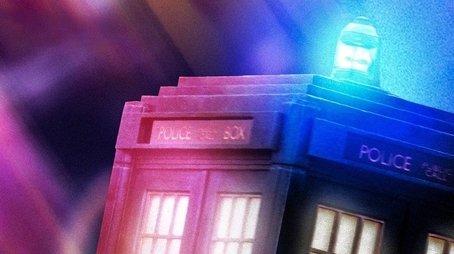
Ask Your Own Question
What is the plot?
The Doctor, a Time Lord from the planet Gallifrey, arrives in modern-day London in the year 2005. He materializes in the TARDIS, a time machine that looks like a blue British police box on the outside but is much larger on the inside. The Doctor, played by Christopher Eccleston, is still reeling from the Time War, a devastating conflict that has left him haunted and alone. He encounters a young woman named Rose Tyler, played by Billie Piper, who works in a shop and is initially skeptical of the strange man in a suit.
Rose is drawn into the Doctor's world when she investigates strange occurrences at her workplace, where mannequins come to life. The Doctor arrives just in time to save her from a living plastic mannequin, known as a Auton, which is part of a larger plot orchestrated by the Nestene Consciousness, an alien intelligence that controls the Autons. The Doctor and Rose work together to defeat the Autons, culminating in a confrontation at a department store where the Doctor uses a device called the sonic screwdriver to destroy the Nestene Consciousness, saving Rose and the city.
After their victory, Rose is captivated by the Doctor and his adventures. He invites her to travel with him in the TARDIS, and she eagerly accepts, leaving her mundane life behind. They embark on a journey through time and space, visiting various locations, including the distant future and the past. Their first stop is the year 5 billion, where they witness the destruction of Earth as the sun expands into a red giant. They meet a group of aliens called the Face of Boe and a human named Captain Jack Harkness, who becomes an ally.
As they continue their travels, the Doctor and Rose face various threats, including the Daleks, a race of genetically engineered mutants that are among the Doctor's oldest enemies. In a gripping encounter, the Doctor is forced to confront his past and the consequences of the Time War. The Daleks invade a space station, and the Doctor must rally the survivors to fight back. He ultimately uses a device called the Delta Wave to destroy the Daleks, but it comes at a great cost, as he is forced to sacrifice the lives of many to save the rest.
Throughout their adventures, Rose develops a deep bond with the Doctor, and her feelings for him grow stronger. However, the Doctor remains emotionally distant, haunted by his past and the loss of his people. Their relationship is tested when they encounter the Cybermen, another of the Doctor's formidable foes. In a climactic battle in London, the Cybermen invade, and the Doctor and Rose must work together to stop them. Rose's mother, Jackie, and her boyfriend, Mickey, become involved in the conflict, adding personal stakes to the battle.
In a pivotal moment, Rose is trapped in a parallel universe after a confrontation with the Cybermen and the Daleks. The Doctor is forced to make a heartbreaking decision to save her, using a device called the Void Ship to send her to safety. As the portal closes, Rose reaches out to the Doctor, and he is left devastated, unable to follow her. This separation marks a significant turning point in the series, as the Doctor is left alone once more, grappling with his feelings of loss and isolation.
The season concludes with the Doctor facing a new threat in the form of the Master, a fellow Time Lord and his arch-nemesis. The Master has returned, and he has a plan to take over Earth using a device called the Toclafane, which are revealed to be the remnants of humanity from the future. The Doctor must confront the Master and his own past while trying to save the planet. In a final showdown, the Doctor manages to defeat the Master, but not without significant consequences.
The season ends with the Doctor reflecting on his journey and the people he has lost. He is left with a sense of hope as he prepares for new adventures, but the emotional scars of his past remain, setting the stage for future storylines and character development.
What is the ending?
In the 2005 series finale of Doctor Who, titled "The Parting of the Ways," the Ninth Doctor, played by Christopher Eccleston, faces off against the Daleks and ultimately sacrifices himself to save his companion, Rose Tyler, and humanity. The Doctor regenerates into the Tenth Doctor, portrayed by David Tennant, marking a significant transition in the series.
As the episode begins, the Doctor, Rose, and Captain Jack Harkness find themselves on the space station Satellite 5, which is under siege by the Daleks. The atmosphere is tense, filled with the sounds of alarms and the frantic movements of the crew as they scramble to defend themselves. The Doctor, with his characteristic bravado, tries to rally everyone, but the weight of the situation is palpable. The Daleks, with their cold, mechanical voices, demand the surrender of the Doctor, showcasing their ruthless nature.
The Doctor learns that the Daleks have been manipulating events from the shadows, using the station to gather information and prepare for their return to power. As the Daleks begin to exterminate the crew, the Doctor devises a plan to use the station's teleport system to send Rose and Jack to safety. He knows that the Daleks are relentless and that their technology is superior, but he refuses to abandon his friends.
In a moment of desperation, the Doctor uses the TARDIS to create a temporal shift, allowing him to confront the Daleks directly. He stands defiantly before them, declaring that he will not be defeated. The Daleks, however, are unyielding, and they reveal their ultimate weapon: a massive Dalek fleet poised to destroy Earth. The Doctor realizes that he must make a grave decision to save Rose and the planet.
As the situation escalates, Rose, who has been a steadfast companion, is drawn into the heart of the conflict. She inadvertently absorbs the power of the Time Vortex, granting her immense abilities. In a moment of connection, she reaches out to the Doctor, and they share a poignant exchange filled with love and understanding. The Doctor, seeing the danger of Rose wielding such power, urges her to let it go, fearing the consequences.
In a climactic moment, Rose uses her newfound power to destroy the Dalek fleet, but the energy surge overwhelms her. The Doctor, witnessing her sacrifice, is filled with anguish. He realizes that he cannot let her die. In a final act of desperation, he channels the energy of the Time Vortex into himself, saving Rose but sealing his own fate. The energy courses through him, and he begins to regenerate, a process that is both painful and transformative.
As the regeneration takes hold, the Doctor's appearance shifts, and he collapses, leaving Rose in shock. The TARDIS, now a beacon of light, envelops the Doctor, and he whispers his final words as the Ninth Doctor, "Bad Wolf," before transforming into the Tenth Doctor. The scene is filled with swirling lights and emotional weight, marking the end of one era and the beginning of another.
In the aftermath, Rose is left standing in the TARDIS, grappling with the loss of the Doctor she knew. The TARDIS console flickers, and she watches as the new Doctor, now played by David Tennant, awakens, filled with a mix of confusion and determination. The transition is jarring, and the emotional stakes are high as Rose must come to terms with the change in her beloved friend.
The episode concludes with the TARDIS flying through the time vortex, symbolizing the endless possibilities that lie ahead, even as the characters face the uncertainty of their new reality. The Doctor, now in a new form, is ready to embark on new adventures, while Rose's heart is heavy with the memories of the Doctor she has lost. The fate of each character is intertwined, setting the stage for future journeys and the enduring bond between the Doctor and his companions.
Is there a post-credit scene?
In the 2005 revival of Doctor Who, there are no post-credit scenes in the traditional sense that have become common in many modern television shows and films. However, the series does feature a unique storytelling style that often includes cliffhangers and teasers for upcoming episodes, particularly at the end of certain episodes.
One notable example occurs at the end of the first episode, "Rose." After the credits roll, there is a brief scene that serves as a teaser for the next episode. In this scene, the Doctor, played by Christopher Eccleston, is seen in the TARDIS, and he receives a call from a mysterious figure, hinting at the dangers and adventures that lie ahead. This moment encapsulates the show's tone, blending intrigue with a sense of urgency, and sets the stage for the Doctor's ongoing journey.
Throughout the series, these kinds of brief moments often serve to connect episodes and build anticipation for future storylines, but they do not follow the conventional post-credit scene format found in other media. Instead, they are integrated into the narrative flow of the show, enhancing the viewer's experience and engagement with the unfolding story.
What is the significance of the Bad Wolf motif throughout the first series?
The Bad Wolf motif serves as a recurring theme throughout the first series of Doctor Who (2005). It appears in various forms, often as graffiti or references in different episodes, leading to a mysterious buildup. The phrase 'Bad Wolf' ultimately culminates in the finale, where it is revealed that Rose Tyler, through her connection with the TARDIS, has scattered the words across time and space to guide the Doctor to her. This connection highlights Rose's growth and the deep bond between her and the Doctor, as well as the consequences of time travel.
How does the Ninth Doctor's regeneration into the Tenth Doctor occur?
The Ninth Doctor, portrayed by Christopher Eccleston, regenerates into the Tenth Doctor, played by David Tennant, in the episode 'The Parting of the Ways.' After a fierce battle against the Daleks, the Doctor is mortally wounded. In a moment of desperation, he absorbs the energy from the Time Vortex to save Rose Tyler, which ultimately leads to his regeneration. The transformation is marked by a brilliant explosion of light and energy, showcasing the Doctor's pain and the bittersweet nature of regeneration, as he bids farewell to his previous self and embraces a new identity.
What role does the Daleks play in the first series of Doctor Who?
The Daleks serve as the primary antagonists in the first series of Doctor Who (2005), particularly in the two-part finale 'Bad Wolf' and 'The Parting of the Ways.' They are depicted as ruthless, emotionless beings bent on exterminating all non-Dalek life forms. Their return marks a significant moment in the series, as they challenge the Doctor's moral convictions and force him to confront the consequences of his actions. The Daleks' presence not only heightens the stakes but also serves as a catalyst for the Doctor's character development, particularly in his relationship with Rose and his struggle with the darker aspects of his nature.
What is the relationship between the Doctor and Rose Tyler?
The relationship between the Doctor and Rose Tyler evolves significantly throughout the first series. Initially, Rose is a curious and adventurous companion who is drawn to the Doctor's enigmatic nature. As they travel through time and space, their bond deepens, marked by moments of trust, vulnerability, and shared experiences. Rose's admiration for the Doctor grows, and she becomes a crucial part of his life, challenging him to confront his emotions and past. Their relationship culminates in a poignant moment in 'The Parting of the Ways,' where Rose's sacrifice and the Doctor's subsequent regeneration highlight the profound impact they have on each other's lives.
What is the importance of the TARDIS in the series?
The TARDIS, the Doctor's time-traveling spaceship, is a central element of the series, symbolizing adventure, freedom, and the vastness of time and space. Its exterior, resembling a blue British police box, contrasts with its expansive interior, which reflects the Doctor's complex personality. Throughout the first series, the TARDIS serves as a safe haven for the Doctor and Rose, allowing them to explore different worlds and face various challenges. The TARDIS also embodies the themes of change and continuity, as it is both a home and a tool for the Doctor, facilitating his journey of self-discovery and his relationships with others.
Is this family friendly?
"Doctor Who" (2005) is generally considered family-friendly, but it does contain some scenes and themes that may be unsettling for younger viewers or sensitive individuals. Here are some potentially objectionable or upsetting aspects:
-
Monsters and Creatures: The show features a variety of alien creatures and monsters, some of which can be frightening in appearance or behavior. For example, the Daleks and Cybermen are iconic villains that may scare younger children.
-
Death and Loss: Themes of death and loss are prevalent throughout the series. Characters face perilous situations, and there are moments of significant emotional weight when companions or loved ones are lost.
-
Violence: While not excessively graphic, there are scenes of violence, including battles and confrontations with aliens. Some episodes depict characters in danger or facing life-threatening situations.
-
Emotional Turmoil: The Doctor and companions often experience deep emotional struggles, including fear, sadness, and anxiety. These moments can be intense and may resonate strongly with sensitive viewers.
-
Dark Themes: Certain episodes explore darker themes, such as war, sacrifice, and moral dilemmas, which may be complex for younger audiences to fully grasp.
-
Scary Situations: Episodes often involve suspenseful scenarios, such as being trapped or pursued by enemies, which can create a tense atmosphere.
While "Doctor Who" is designed to be accessible to a wide audience, parents may want to preview episodes or discuss themes with younger viewers to ensure they are comfortable with the content.











